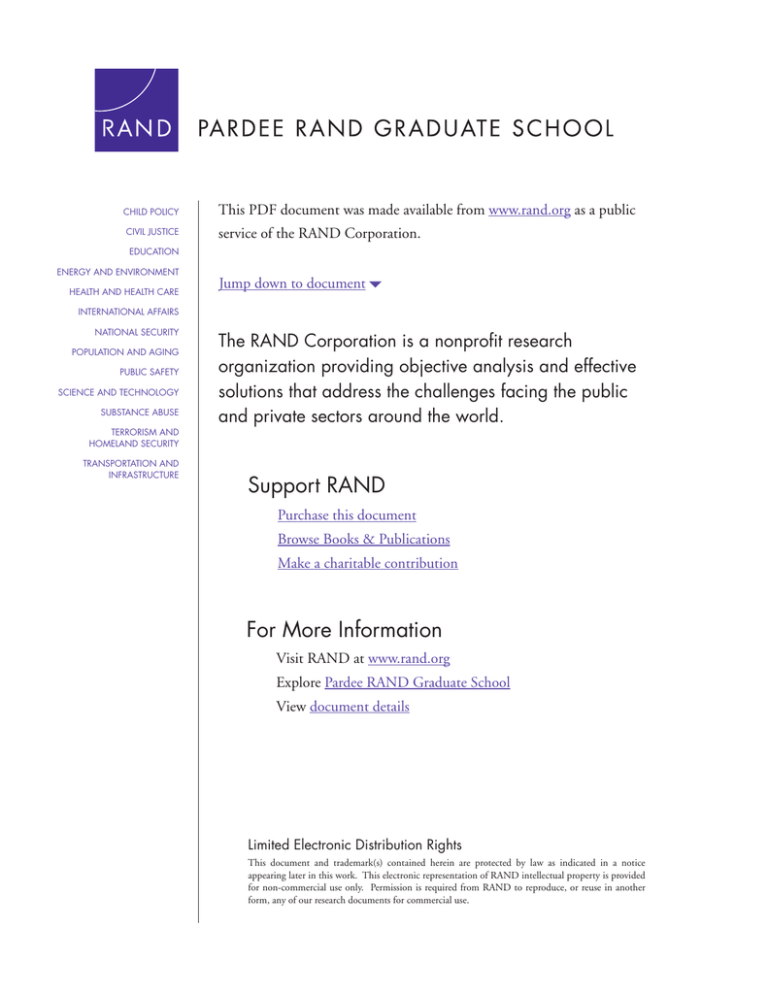
CHILD POLICY
CIVIL JUSTICE
This PDF document was made available from www.rand.org as a public
service of the RAND Corporation.
EDUCATION
ENERGY AND ENVIRONMENT
HEALTH AND HEALTH CARE
Jump down to document6
INTERNATIONAL AFFAIRS
NATIONAL SECURITY
POPULATION AND AGING
PUBLIC SAFETY
SCIENCE AND TECHNOLOGY
SUBSTANCE ABUSE
TERRORISM AND
HOMELAND SECURITY
TRANSPORTATION AND
INFRASTRUCTURE
The RAND Corporation is a nonprofit research
organization providing objective analysis and effective
solutions that address the challenges facing the public
and private sectors around the world.
Support RAND
Purchase this document
Browse Books & Publications
Make a charitable contribution
For More Information
Visit RAND at www.rand.org
Explore Pardee RAND Graduate School
View document details
Limited Electronic Distribution Rights
This document and trademark(s) contained herein are protected by law as indicated in a notice
appearing later in this work. This electronic representation of RAND intellectual property is provided
for non-commercial use only. Permission is required from RAND to reproduce, or reuse in another
form, any of our research documents for commercial use.
This product is part of the Pardee RAND Graduate School (PRGS) dissertation series.
PRGS dissertations are produced by graduate fellows of the Pardee RAND Graduate
School, the world’s leading producer of Ph.D.’s in policy analysis. The dissertation has
been supervised, reviewed, and approved by the graduate fellow’s faculty committee.
Gearing Up and Getting
There
Improving Local Response to
Chemical Terrorism
BRIAN K. HOUGHTON
This document was submitted as a dissertation in April 2004 in partial
fulfillment of the requirements of the doctoral degree in policy analysis at the
Pardee RAND Graduate School. The faculty committee that supervised and
approved the dissertation consisted of Bruce W. Bennett (Chair), Dick J.
Hillestad, and Eric V. Larson. James L. Regens was the outside reader for the
dissertation.
The Pardee RAND Graduate School dissertation series reproduces dissertations that have
been approved by the student’s dissertation committee.
The RAND Corporation is a nonprofit research organization providing objective analysis
and effective solutions that address the challenges facing the public and private sectors
around the world. RAND’s publications do not necessarily reflect the opinions of its research
clients and sponsors.
R® is a registered trademark.
© Copyright 2004 RAND Corporation
All rights reserved. No part of this book may be reproduced in any form by any electronic or
mechanical means (including photocopying, recording, or information storage and retrieval)
without permission in writing from RAND.
Published 2004 by the RAND Corporation
1700 Main Street, P.O. Box 2138, Santa Monica, CA 90407-2138
1200 South Hayes Street, Arlington, VA 22202-5050
201 North Craig Street, Suite 202, Pittsburgh, PA 15213-1516
RAND URL: http://www.rand.org/
To order RAND documents or to obtain additional information, contact
Distribution Services: Telephone: (310) 451-7002;
Fax: (310) 451-6915; Email: order@rand.org
Abstract
This dissertation identifies policies and organizational options at the local level that could
save lives and/or reduce injury likely to occur from an act of chemical terrorism. The dissertation
seeks out low-cost options to improve the current performance level in responding to chemical
terrorism. The dissertation uses Los Angeles as a case study in this effort.
The dissertation follows a four-part framework. First, it attempts to determine the level of
risk of chemical terrorism in Los Angeles and identifies an anticipated magnitude for which
emergency responders and decision makers should plan. Second, the dissertation considers
current capability and performance levels in chemical terrorism response and determines a
performance goal for response to the planning magnitude. Third, through modeling and
simulation the dissertation presents low-cost options in equipment, training, organization and
doctrine that could improve the response to a chemical terrorist event. Lastly, the dissertation
examines these low-cost options in terms of budget considerations in Los Angeles.
The dissertation’s findings point to decentralizing counter-chemical terrorism equipment
throughout the Los Angeles metropolitan area, the reformulation of certain doctrinal policies that
may inadvertently slow the mitigation process, the establishment of low-cost training methods to
enhance the specialized knowledge needed to respond effectively, the inclusion of doctrinal
polices to accelerate the decontamination process, and the continued focus on an all-hazards
approach to preparedness.
xi





